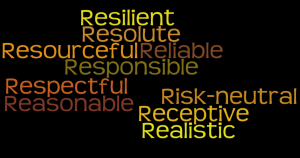Lately, the idea of teaching people, particularly women, self-defense as a method for increasing personal safety has come under attack. A primary complaint from certain advocates/bloggers is that self-defense doesn’t work or is ineffective. As proof, many of these advocates will point out real life examples in which they, or someone they know, were assaulted despite claiming to have engaged in self-defense strategies.
These advocates are both right and wrong. There are correct in their assessment that self-defense strategies don’t work for everyone. They are wrong in thinking that self-defense strategies are inherently ineffective. In order to be effective for personal safety over time, the person implementing the self-defense strategies must have certain R-characteristics. Without these important R-characteristics being present , self-defense strategies are much less likely to succeed.
For self-defense strategies to be an effective methodology of personal safety a person must be:
1. Respectful of self, other people, and environments.
2. Resourceful and able to solve problems with or without help.
3. Resilient and able to deal with stressful situations and traumatic events.
4. Responsible in his or her actions, behaviors, and critical thinking.
5. Reliable and consistent in implementing strategies, tactics, and techniques.
6. Receptive to other people’s behavioral signs and cues, alternate viewpoints and opinions, and changing current lifestyle.
7. Resolute and strong willed in implementing his or her self-defense strategies.
8. Realistic in his or her real world assessments and decision making.
9. Reasonable in his or her dealings with other people and his or her responses.
10. Risk-neutral, neither constantly fearful nor regularly fearless in his or her assessments, actions, and behaviors
On the other hand, self-defense is unlikely to work for someone who is:
1. Disrespectful to self (has low self-esteem) and/or is disrespectful to others.
2. Dependant and requires other people to solve problems for him or her.
3. Fragile and unable to handle stressful and traumatic events both past and present.
4. Engaging in irresponsible behaviors and activities.
5. Undependable and intermitently engages in self-defense strategies.
6. Closed minded to alternative viewpoints and is unwilling to modify behaviors.
7. Waivering and weak willed.
8. Irrational and/or impractical in his or her assessments and decision making,
9. Baised and intolerant in his or her beliefs.
10. Constantly fearful or regularly fearless in his or her assessments, actions, and behaviors.
When someone tries to convince you that self-defense doesn’t work or is a form of victim-blaming, take a look at his or her R-characteristics. Does he or she exhibit these ten R-characteristics or the opposite? If he or she exhibits the opposite, is it any wonder why he or she would actively campaign against teaching people self-defense?
NOTE: There are many situations where there was nothing a person could have done to prevent or alter the outcome of an assault. But the existence of these situations do not diminish the effectiveness of self-defense as a means of personal safety. Seat belts are a proven means of automobile personal safety. Yet, every year many people wearing seat belts are killed or seriously injured in automobile accidents. Despite this fact, when implemented properly, both seat belts and self-defense strategies save lives and reduce serious injuries on average over time.
